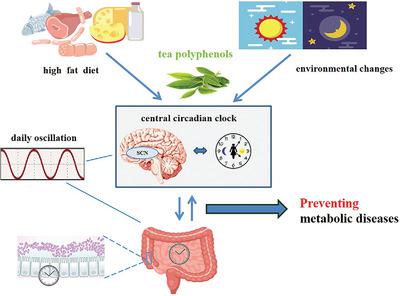当前位置:
X-MOL 学术
›
Mol. Nutr. Food Res.
›
论文详情
Our official English website, www.x-mol.net, welcomes your
feedback! (Note: you will need to create a separate account there.)
Interaction between Tea Polyphenols and Intestinal Microbiota in Host Metabolic Diseases from the Perspective of the Gut-Brain Axis.
Molecular Nutrition & Food Research ( IF 4.5 ) Pub Date : 2020-06-21 , DOI: 10.1002/mnfr.202000187 Ruonan Yan 1 , Chi-Tang Ho 2 , Xin Zhang 1
Molecular Nutrition & Food Research ( IF 4.5 ) Pub Date : 2020-06-21 , DOI: 10.1002/mnfr.202000187 Ruonan Yan 1 , Chi-Tang Ho 2 , Xin Zhang 1
Affiliation

|
Tea polyphenols (TP) have shown multiple biological activities and the ability to modulate the composition and function of intestinal microbiota. Certain human metabolic diseases are engendered by the disruption of the circadian rhythm. Circadian rhythm oscillations exist in both intestinal microbiota and hypothalamus. The brain–gut‐microbiome axis enables intestinal microorganisms to communicate with the brain. The close reciprocity between intestinal microbiota and circadian rhythm supplies a new opportunity for TP to regulate circadian‐rhythm‐related diseases relying on intestinal microbiota. Therefore, based on the potential bidirectional association of the brain and gut microbes, this review mainly discussed the interaction between TP and intestinal microbiota from the perspective of the gut–brain axis (GBA) to improve the theory of metabolic diseases prevention.
中文翻译:

从肠-脑轴的角度来看,茶多酚与宿主代谢疾病中肠道菌群之间的相互作用。
茶多酚(TP)已显示出多种生物活性,并具有调节肠道菌群组成和功能的能力。某些人的代谢性疾病是由昼夜节律的破坏引起的。肠道菌群和下丘脑都存在昼夜节律性振荡。脑-肠-微生物组轴使肠道微生物能够与大脑进行通讯。肠道菌群与昼夜节律之间的紧密互惠性为TP调节依赖于肠道菌群的昼夜节律相关疾病提供了新的机会。因此,基于大脑和肠道微生物之间潜在的双向关联,
更新日期:2020-06-21
中文翻译:

从肠-脑轴的角度来看,茶多酚与宿主代谢疾病中肠道菌群之间的相互作用。
茶多酚(TP)已显示出多种生物活性,并具有调节肠道菌群组成和功能的能力。某些人的代谢性疾病是由昼夜节律的破坏引起的。肠道菌群和下丘脑都存在昼夜节律性振荡。脑-肠-微生物组轴使肠道微生物能够与大脑进行通讯。肠道菌群与昼夜节律之间的紧密互惠性为TP调节依赖于肠道菌群的昼夜节律相关疾病提供了新的机会。因此,基于大脑和肠道微生物之间潜在的双向关联,











































 京公网安备 11010802027423号
京公网安备 11010802027423号